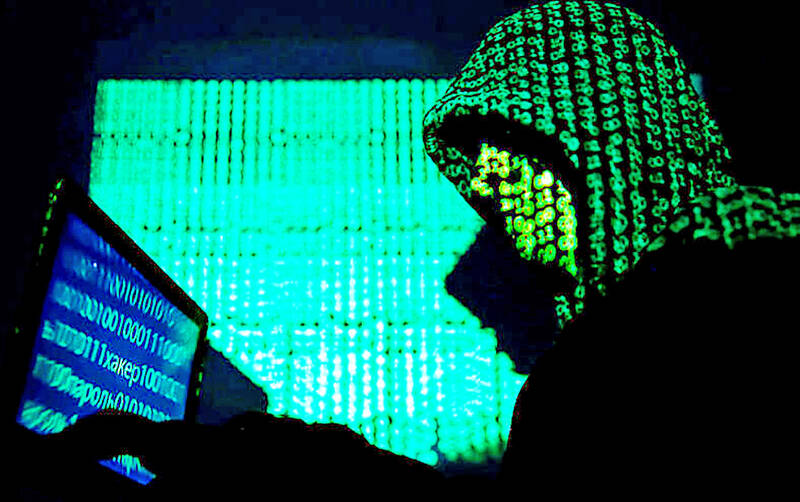The Ministry of National Defense’s (MND) Information, Communications and Electronic Force Command (ICEFCOM) yesterday denied accusations by China that it had undermined regional security by carrying out cyberattacks against targets in China, adding instead that Beijing was responsible for raising tensions and undermining regional peace.
The Chinese Ministry of State Security on WeChat accused a hacker group called “Anonymous 64” of targeting China, Hong Kong and Macau starting earlier this year through frequent cyberattacks.
The group carried out cyberattacks to seize control of Web sites, outdoor electronic billboards and video-on-demand platforms in China, Hong Kong and Macau, it said, adding the hackers’ activities include spreading false information, creating rifts in the public and weakening the governance of the Chinese Communist Party.

Photo: Reuters
It claimed that “Anonymous 64” is actually a front for ICEFCOM’s Cyber Warfare Unit, and identified three individuals it said are members of the Taiwanese military being investigated for being involved in the alleged cyberattacks
ICEFCOM, established in July 2017, is a relatively new, but important unit responsible for managing military communications, network security and information warfare. It has about 6,000 personnel.
ICEFCOM yesterday denied the allegations, and instead called out China’s use of “gray zone” tactics as raising regional tensions.

Photo: screen grab from China Central Television
“The current enemy situation and cyberthreats are severe,” it said in a statement. “The Chinese communist military and forces that coordinate with it continue to use aircraft, ships and cyberattacks to harass Taiwan and are ... undermining regional peace.”
The geopolitical threats Taiwan faces are severe, including disruptions by aircraft, naval vessels, cyberattacks, misinformation and other means, ICEFCOM said, adding that it would continue to strengthen its defenses to maintain national security.
The ministry said that “Anonymous” is a well-known hacker collective that frequently targets undemocratic regimes, and China has added the No. 64 to the name to make it seem as though it is the sole target.
It is an attempt by China to gloss over recent accusations from the international community regarding its cyberwarfare tactics, as well as a way of undermining international support for Taiwan, it added.
A national security official speaking on condition of anonymity yesterday said that it is an attempt by China to increase domestic anti-Taiwanese sentiment and inflame tensions across the Taiwan Strait.
Institute for National Defense and Security Research deputy CEO Shen Ming-shih (沈明室) said that China publishing the names and photographs of the accused is an attempt to create a chilling effect within Taiwan’s armed forces and deter personnel from being loyal to the government.
The invisible nature of cyberwarfare means that ICEFCOM and its cyberunit often engage in highly sensitive and covert operations.
ICEFCOM played a major role in the 2022 Han Kuang 38 live-fire joint military exercise, where it simulated key military command centers under attack transferring to backup command centers, sources said. It also played a key role in defending Taiwan’s digital infrastructure in August of that year when then-US House of Representatives speaker Nancy Pelosi visited Taiwan, leading to Chinese cyberattacks on Web sites, digital billboards and other infrastructure, they said..
Additional reporting by Aaron Tu, Chen Yu-fu and Reuters

INVESTIGATION: The case is the latest instance of a DPP figure being implicated in an espionage network accused of allegedly leaking information to Chinese intelligence Democratic Progressive Party (DPP) member Ho Jen-chieh (何仁傑) was detained and held incommunicado yesterday on suspicion of spying for China during his tenure as assistant to then-minister of foreign affairs Joseph Wu (吳釗燮). The Taipei District Prosecutors’ Office said Ho was implicated during its investigation into alleged spying activities by former Presidential Office consultant Wu Shang-yu (吳尚雨). Prosecutors said there is reason to believe Ho breached the National Security Act (國家安全法) by leaking classified Ministry of Foreign Affairs information to Chinese intelligence. Following interrogation, prosecutors petitioned the Taipei District Court to detain Ho, citing concerns over potential collusion or tampering of evidence. The

‘FORM OF PROTEST’: The German Institute Taipei said it was ‘shocked’ to see Nazi symbolism used in connection with political aims as it condemned the incident Sung Chien-liang (宋建樑), who led efforts to recall Democratic Progressive Party (DPP) Legislator Lee Kun-cheng (李坤城), was released on bail of NT$80,000 yesterday amid an outcry over a Nazi armband he wore to questioning the night before. Sung arrived at the New Taipei City District Prosecutors’ Office for questioning in a recall petition forgery case on Tuesday night wearing a red armband bearing a swastika, carrying a copy of Adolf Hitler’s Mein Kampf and giving a Nazi salute. Sung left the building at 1:15am without the armband and apparently covering the book with a coat. This is a serious international scandal and Chinese

Seventy percent of middle and elementary schools now conduct English classes entirely in English, the Ministry of Education said, as it encourages schools nationwide to adopt this practice Minister of Education (MOE) Cheng Ying-yao (鄭英耀) is scheduled to present a report on the government’s bilingual education policy to the Legislative Yuan’s Education and Culture Committee today. The report would outline strategies aimed at expanding access to education, reducing regional disparities and improving talent cultivation. Implementation of bilingual education policies has varied across local governments, occasionally drawing public criticism. For example, some schools have required teachers of non-English subjects to pass English proficiency

TRADE: The premier pledged safeguards on ‘Made in Taiwan’ labeling, anti-dumping measures and stricter export controls to strengthen its position in trade talks Products labeled “made in Taiwan” must be genuinely made in Taiwan, Premier Cho Jung-tai (卓榮泰) said yesterday, vowing to enforce strict safeguards against “origin laundering” and initiate anti-dumping investigations to prevent China dumping its products in Taiwan. Cho made the remarks in a discussion session with representatives from industries in Kaohsiung. In response to the US government’s recent announcement of “reciprocal” tariffs on its trading partners, President William Lai (賴清德) and Cho last week began a series of consultations with industry leaders nationwide to gather feedback and address concerns. Taiwanese and US officials held a videoconference on Friday evening to discuss the